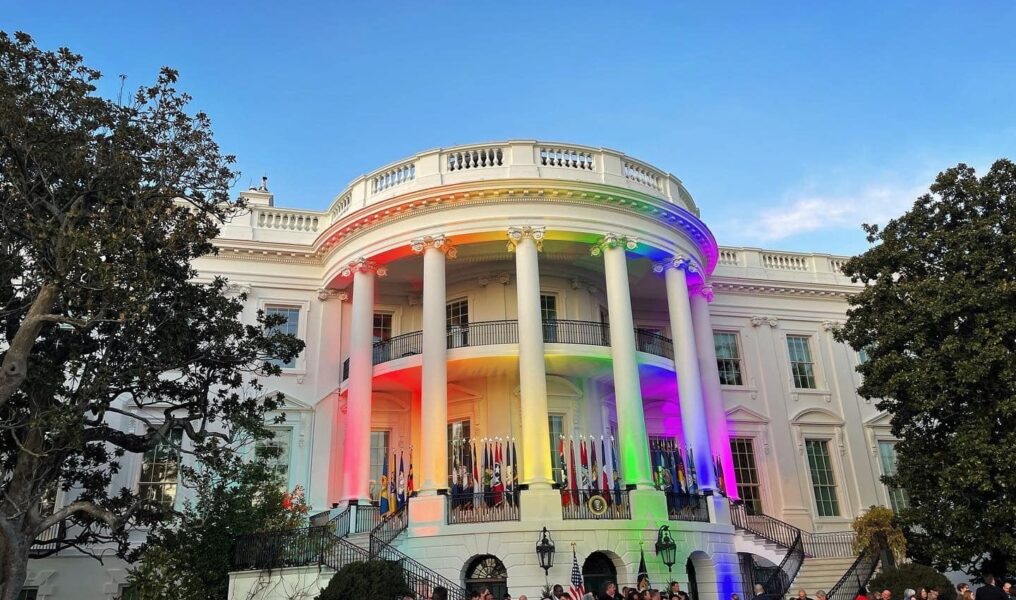5 Headlines That Dominated LGBTQ+ News in 2022
The queer community experienced unprecedented highs and lows this year

There was no shortage of dramatic and consequential events to consider as the top stories for the LGBTQ+ community in 2022, and most of those events threaten to spill over into 2023. As we head into a new year, here are five of the most important LGBTQ+ news stories of 2022.
Russia imprisons basketball star Brittney Griner

Brittney Griner. Photo: Instagram (@brittneyyevettegriner)
Brittney Griner, a lesbian professional basketball player and Olympic gold medalist, became the focus of months-long world-wide attention, after she was detained at a Russian airport, accused of possessing of marijuana. Authorities held her just a week before Russia invaded Ukraine.
Griner acknowledged having a small amount of “hash oil” in her bag, saying it was for medical purposes and that she had meant to leave it at home. Griner had been playing with a Russian women’s basketball team for eight years, earning four times what she earns as an All-Star member of the Phoenix Women’s National Basketball Association team. Russian authorities scheduled her for trial.
By May, the U.S. government announced it believed Griner was being “wrongfully detained” and Russian media began claiming that a deal was underway for the U.S. to exchange a convicted Russian arms distributor for Griner’s return. Meanwhile, Griner’s spouse, Cherelle Griner, made appearances on national media outlets to pressure President Biden to do more to secure Griner’s release.
Russian officials found Griner guilty during a trial in July. In August, she was sentenced to nine years in prison. More than three months went by before the White House suddenly announced it had reached an agreement with Russian officials to exchange the arms felon, Viktor Bout, for Griner. On Dec. 8, Griner was freed and flew back to the U.S. She issued a statement Dec. 16, thanking all the people and fans who provided love and help. She also noted that she will be playing with the Phoenix Mercury again next season.
Two lesbians elected governor
Two lesbians were elected governor of their states in 2022: Maura Healey in Massachusetts and Tina Kotek in Oregon.
Healey served for eight years as the Massachusetts attorney general, along the way becoming a popular Democrat in a deeply blue state. Her Nov. 8 victory made her the first lesbian to be elected governor of any state. Healey, who helped lead the legal battle against the federal Defense of Marriage Act and for marriage equality also championed many legal challenges against Trump administration policies.
Kotek was declared the winner of Oregon’s gubernatorial race Nov. 9, a full week after the voting, winning by more than four percentage points.
Jared Polis, the nation’s first openly gay male governor, won re-election to the Colorado governor’s office Nov. 8, meaning three of the nation’s 50 governors will be openly LGBTQ+ in 2023. Bisexual Kate Brown, the departing governor of Oregon, was the nation’s first openly LGBTQ+ governor, finishing out a term of a previous governor and then winning election herself in 2016.
Rise in anti-LGBTQ+ legislative efforts

Florida Gov. Ron DeSantis. Photo: Washington Blade[/caption]
In May, potential Republican presidential candidate Ron DeSantis, governor of Florida, encouraged and signed into law a bill that severely curtails teachers from discussing sexual orientation or gender identity in schools. Copycat “Don’t Say Gay” bills sprung up around the country, including by Republicans in Congress who introduced a similar bill in the U.S. House.
This was part of a nationwide barrage of anti-LGBTQ+ legislation and governors’ directives. DeSantis took another dramatic step in December, bypassing the Republican-controlled legislature to issue an order blocking transition medical care for transgender minors.
In May, the Texas Supreme Court upheld the governor’s order to direct child welfare workers to report any instances of gender-confirming health care for children. Arizona passed a bill to prohibit transition surgery for young people and to ban transgender girls from participating in girls’ sports. Alabama passed a bill to make it a felony to offer gender-affirming health care to transgender people under the age of 19. Other states followed suit, filing similar legislation, much of which is now pending for the 2023 session.
Human Rights Campaign President Kelley Robinson told a U.S. House hearing in December that the “onslaught“ of anti-LGBTQ+ bills in 2022 totaled at least 344 bills in 23 states.
“More than 25 of these bills were ultimately enacted across 13 states — 17 of which have a disproportionate or targeted impact on transgender people.’
Club Q shooting part of larger anti-LGBTQ+ violence trend
A 22-year-old male in November shot and killed five patrons and injured 17 at Club Q, a Colorado Springs bar popular with LGBTQ+ people and their allies. The killer opened fire with a modified AR-15 style rifle until a patron at the bar, a U.S. military veteran, knocked the gunman down and, with the help of one of the club’s performers, subdued him.
A Nov. 30 bulletin
from the U.S. Department of Homeland Security (DHS) warned of potential additional attacks on LGBTQ+ bars. It noted that, after the Club Q shooting, the DHS observed messages “on forums known to post racially or ethnically motivated violent extremist content praising the alleged [Club Q] attacker.” Club Q had operated in conservative Colorado Springs for 21 years without any threats or attacks.
A Human Rights Campaign report in November indicated at least 32 people had been killed thus far in 2022 because of their sexual orientation or gender identity. Sixty-five percent of those victims were black transgender women.
In Coeur d’Alene, Idaho, police arrested 31 men in their twenties in June in connection with a plot by the white nationalist group Pride Front. Reports said the police found the group waiting in a U-Haul, carrying metal pipes and wearing riot gear, with a plan on how to disrupt the family-friendly festival there.
In December, the Human Rights Campaign issued a report showing a “highly organized attack” was being waged against more than two dozen hospitals which provided gender-affirming care.
President Biden Signs Respect for Marriage Law
On Dec. 13, President Biden signed into law a federal bill to repeal the now-defunct Defense of Marriage Law and to require states to recognize any marriage, including a same-sex marriage, licensed by another state.
U.S. Rep. Jerrold Nadler (D-NY), a longtime friend of the LGBTQ+ community, introduced the legislation to the House in July, and it passed the House right away on a 267 to 157 vote. It was after mid-term elections that it finally started moving in the Senate, where it was led by openly lesbian U.S. Senator Tammy Baldwin (D-Wisc.). There, it passed 61 to 36 (three not voting, including Georgia’s Democratic Senator Raphael Warnock, who was locked in a Dec. 5 runoff election against Republican nominee Herschel Walker). The New York Times gave much of the credit to former President George W. Bush’s now openly gay campaign manager, Ron Mehlman and a group of other Republicans for lobbying Republican senators to secure the 11 GOP votes they needed to pass a procedural hurdle to take a vote on the measure.
The Respect for Marriage Act originated in 2009 but was refurbished by Nadler this year after U.S. Supreme Court conservatives made clear many of them were eager to revisit the landmark Obergefell decision in 2015 that had struck down state bans on same-sex marriage.









